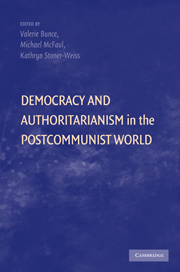Book contents
- Frontmatter
- Contents
- Prologue
- PART I WAVES OF REGIME CHANGE: FROM DICTATORSHIP TO DEMOCRACY…AND BACK?
- 1 The Missing Variable
- 2 A Regional Tradition
- PART II ENCOURAGING DEMOCRACY: THE ROLE OF THE EUROPEAN UNION
- PART III CHOOSING REGIME CHANGE: DEMOCRATIZING ELECTIONS
- PART IV RESISTING REFORM: BACKSLIDING DEMOCRACIES AND ENDURING AUTOCRACIES
- Epilogue
- Index
- References
1 - The Missing Variable
The “International System” as the Link between Third and Fourth Wave Models of Democratization
Published online by Cambridge University Press: 05 June 2012
- Frontmatter
- Contents
- Prologue
- PART I WAVES OF REGIME CHANGE: FROM DICTATORSHIP TO DEMOCRACY…AND BACK?
- 1 The Missing Variable
- 2 A Regional Tradition
- PART II ENCOURAGING DEMOCRACY: THE ROLE OF THE EUROPEAN UNION
- PART III CHOOSING REGIME CHANGE: DEMOCRATIZING ELECTIONS
- PART IV RESISTING REFORM: BACKSLIDING DEMOCRACIES AND ENDURING AUTOCRACIES
- Epilogue
- Index
- References
Summary
The first transitions from communist rule in Eastern Europe and Eurasia at the end of the 1980s and the beginning of the 1990s did not resemble many of the transitions from authoritarian rule in the previous two decades. Why? Some have suggested that countries in the communist world shared distinguishing historical legacies or particular institutional configurations that made them different from countries in Latin America and Southern Europe, which had path-dependent consequences for the kind of transition they experienced. These differences are most certainly a major part of the explanation. However, this chapter argues that the configuration of the international system also played a causal role. The bipolar system of the Cold War constrained the kinds of transitions possible, both in the “East” and in the “West.” By 1989, this international system was in transition to a new global order anchored by one hegemon, the United States. This new system allowed a wider range of transitions than were possible in the previous era. The international system is the missing independent variable that helps unify theories about the third wave and the fourth wave, and moves us closer to a general theory of democratization.
To demonstrate the causal influence of the international system on regime transitions, the essay proceeds as follows. Section I outlines the basic elements of the third wave literature and then contrasts this paradigm with the basic elements of the fourth wave model.
Information
- Type
- Chapter
- Information
- Publisher: Cambridge University PressPrint publication year: 2009
References
Accessibility standard: Unknown
Why this information is here
This section outlines the accessibility features of this content - including support for screen readers, full keyboard navigation and high-contrast display options. This may not be relevant for you.Accessibility Information
- 4
- Cited by
